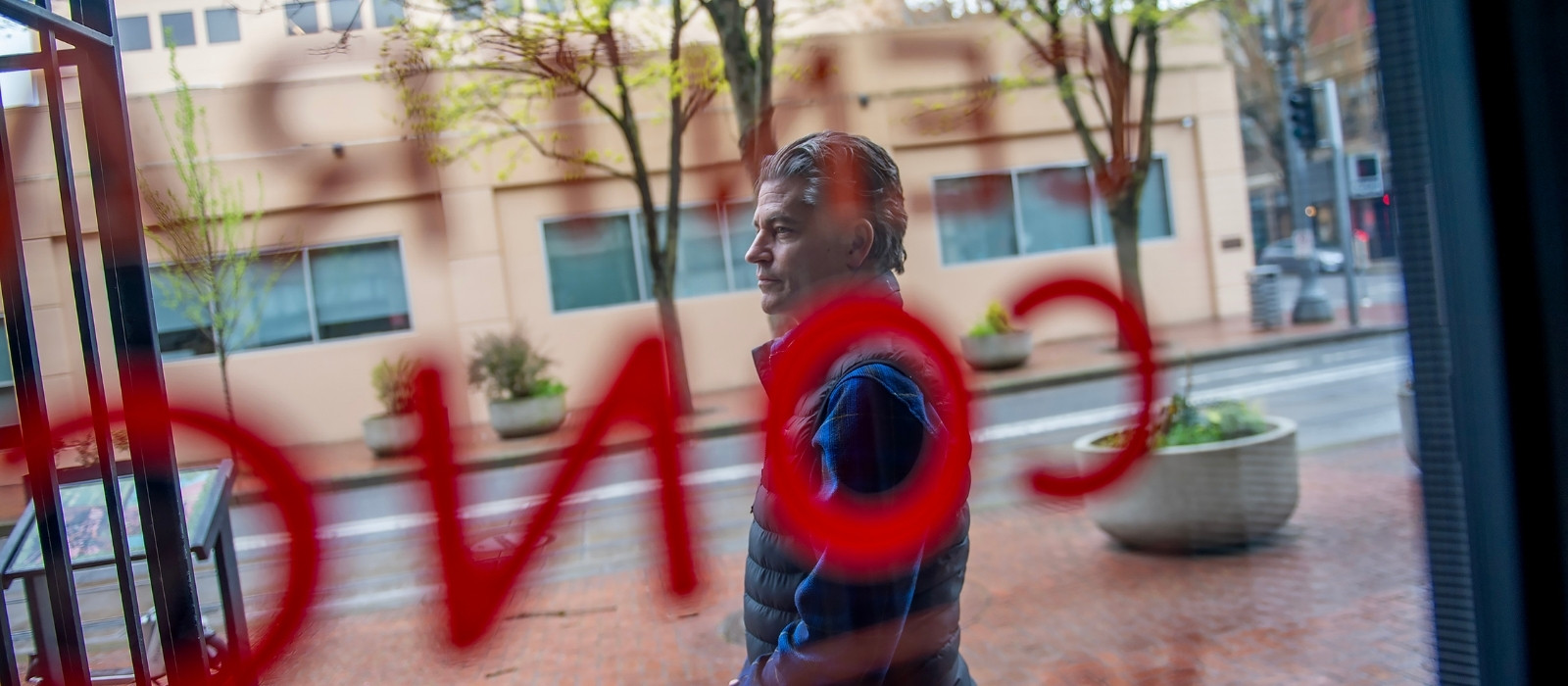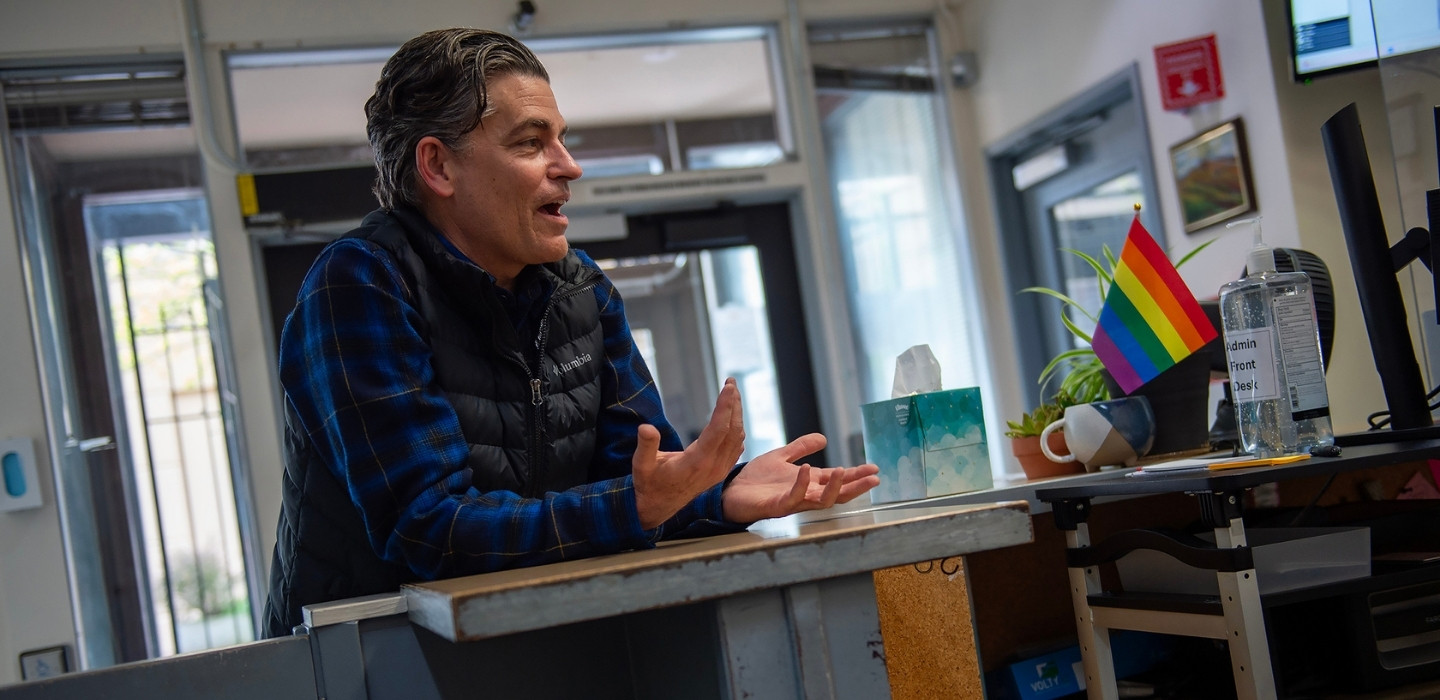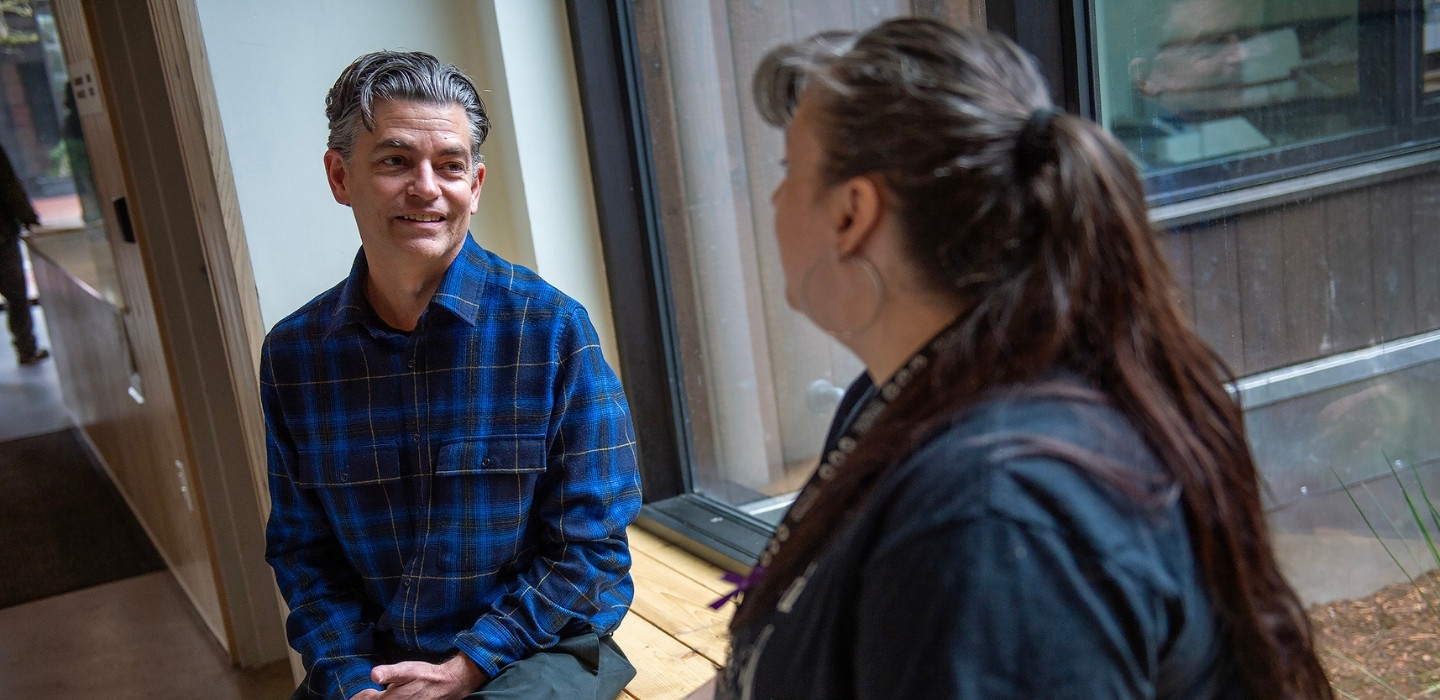SUMMER 2025
The Golden Threads
As the president and CEO of Central City Concern, Portland’s largest nonprofit devoted to homelessness, Andy Mendenhall ’94 leads with hope and compassion.
- Story by Cheston Knapp

Photos by: Amanda Lucier
LIKE A LOT of folks who spend their lives devoted to a calling, Andy Mendenhall ’94 remembers the first time he heard his.
The experience is etched into his mind, as though it were a commandment. It was a rainy Friday night in Portland. October, 1991. He and a few of his hallmates from Christie had volunteered to deliver food to Transition Projects, a homeless shelter in Old Town Portland. This was the first of many such nights for Andy, who would go on to coordinate the outreach program for two years. They picked up close to 200 pounds of spaghetti, meatballs, and garlic bread from the dining hall and piled it into the back of a van they’d borrowed from the school. It’s easy to imagine the heady vibe inside that mobile Olive Garden: the medley of toothsome smells, the budding passion for service. They were goodwill on wheels.
When they got to the shelter, they found 150 people gathered together in one large room, waiting for them.
“Up to that point in my life, I hadn’t seen the lived reality of deep poverty,” Andy told me, running his hands through his Bruce Wayne hair. “I hadn’t encountered what hunger really meant.”
This experience alone might have been poignant enough to tenderize the heart of a young Eagle Scout from Arizona, eager to make a difference in the world, but the story doesn’t end there. While he and his hallmates were doling out plates of pasta, a short, powder blue school bus pulled up outside. Andy watched as five or six people were escorted off, wearing flip-flops and surgical scrubs. No coats or hats, despite the cold and the rain. They each held a small baggie that contained their medications and some government-issued toiletries, like a two-bit toothbrush and a bar of bulk soap. You can almost hear the hush pass over the crowd as they entered the shelter’s communal room, frightened and confused.
These turned out to be residents—former residents—of Dammasch State Hospital, a mental health institution in Wilsonville, OR, that was in the process of closing. At the time, a nationwide movement toward deinstitutionalization had led to deep budget cuts, which opened glaring holes in the health care system, putting tremendous strain on smaller service providers. Every Friday, five or six more people would be released, dropped at shelters around town and left more or less to fend for themselves.
“These folks were being removed from a controlled, structured environment where they were safe, and they were being discharged to the streets, not another level of service,” Andy said, still appalled. “The look of fear and vulnerability in their eyes amplified their humanity for me, and it solidified my desire to care for people like them.”
For Andy, this memory holds the two strands of his nearly 30-year career as a doctor and a public health advocate. He knows how necessary it is—physically and psychologically—to help people out on an individual level, to relieve their pressing needs for food and shelter. And he also knows how important it is to avoid (and redress) systemic failures like closing a mental hospital without having a comprehensive plan in place. As the president and CEO of Central City Concern, the largest nonprofit in Portland devoted to homelessness and its related issues, he has to hold both strands at the same time, a task he performs with grace, compassion, and humility.
“The thing those people needed and were struggling to have in that moment was connection,” he said. “And at the end of the day, connection is a huge part of what we do at CCC.”
COMPREHENSIVE CARE
Central City Concern was founded in 1979, with a relatively modest goal of serving homeless people struggling with alcoholism. It has since transformed into a far more capacious organization, one that offers a full complement of services to the city’s homeless population. It’s unique among the area’s nonprofits for its commitment to providing wraparound services to its clients, an approach that is at once commonsensical and incredibly ambitious.
At its core, CCC operates from the idea that homelessness isn’t simply about lacking shelter. It’s often accompanied by other issues, like addiction and mental illness. CCC doesn’t ignore these issues, but aims to treat them with a “continuum of care.” Addressing the housing issue, in other words, is the first, not final, step in getting a person on the path toward full social rehabilitation.
“We talk a lot about our Golden Threads,” Andy said, vibrating with positive energy as he wrote on a large whiteboard in his office. “That’s our goal of taking people who are suffering from homelessness, substance use disorders, or severe mental illness, and getting them housed, healthier, and connected.”
This image recalls the story of Theseus, from Greek mythology, who journeyed to the center of the Labyrinth to slay the brutal Minotaur. Before he entered that daedal compound, his lover, Ariadne, gave him a ball of thread that he unspooled behind him as he went, leaving a trail he could follow back out of the maze. By preventing him from getting lost in those dark and winding halls, the thread served as his literal lifeline.
It’s easy to see why Andy embraces this metaphor. By offering supportive housing, detox and recovery programs, health care for both chronic and acute conditions, employment support, peer mentoring, and more, CCC is doing everything they can to provide their clients a way out of the labyrinth of homelessness, addiction, and mental illness. What makes their approach special is how these services work together in concert. A client might first connect with CCC through a street outreach program, then access health care at their clinic, and eventually move into transitional housing. They might enter Hooper, CCC’s detox facility, and then continue in a recovery program while seeking out job training. Point is, there’s never going to be a one-size-fits-all solution to the problem of homelessness—there are as many paths out of the maze as there are people caught inside it. And CCC’s goal is to be able to meet each of them where they are.

CHIEF EMPATHY OFFICER
For as long as Andy can remember, he’s wanted to be a doctor. After graduating from UP, he trained as a family physician at OHSU and went on to work at Providence Health & Services. He chose to become a generalist, rather than a specialist, largely because it allowed him to build deeper relationships with his patients.
“You’re as much a witness to their lives as you are a clinician,” he said. “And for me this goes back to my spiritual traditions, grounded in the healing ministry of compassion and humanity.”
But while he loved practicing medicine, Andy continued to feel the pull of public health. He wanted to improve the quality of and access to medical care for as many people as he possibly could, and in order to achieve that he needed to dream big. As a physician, he’d noticed a pervasive and depressing stigma against providing treatment to low-income or homeless individuals, as well as to folks who were struggling with alcohol or other substances. Doctors and health care institutions appeared to be running away from problems that they should have been running toward, he thought. Isn’t that what the Hippocratic Oath is all about? This further stoked his desire to make meaningful changes to the system, to help ensure that people could get the care they needed.
“I want to close gaps for vulnerable members of our community, change the stories of their lives, and transform the way they engage in society,” he said.
In 2010, he co-founded Healthworks NW, an outpatient substance-abuse program, which was acquired by Hazelden Betty Ford two years later. He started working with CCC in 2017 and soon became the organization’s Chief Medical Officer, a position that allowed him to marry his practical and theoretical passions. Now, as the organization’s CEO, he continues to work toward his original goal of providing more sustainable and more ethical care to people who need it most.
“I believe we’re a model for communities around the country,” he said, while freely acknowledging how much work still needs to be done. “Our system of services saves lives and it saves money. This is a case where doing the right thing for people is the most fiscally conservative thing we can do. But this only works if you build connection. And you can’t have connection without trust.”
IN OUR BACKYARD
It’s no secret that Portland has been dealing with a homelessness crisis for years. A count from 2025 found that more than 14,000 people were experiencing homelessness in Multnomah County and that we had the highest unsheltered homeless rate (6,275) in the city’s history. In 2023, more than 450 people died unsheltered. Last fall, Mayor Keith Wilson (MBA ’98) campaigned on a platform of tackling the problem head on, calling it “the biggest humanitarian crisis our city has ever faced.”
The statistics are tough for most of us to hold in mind. Dwelling on them for any length of time can gentle you into a grim quiescence that scholars call “scope neglect.” The larger the problem becomes, the harder it is to conceive of. It’s the idea behind that famous quote: “One death is a tragedy, a million is a statistic.” But it can be equally hard to treat each instance of homelessness as the tragedy it is. Trying to do this can quickly lead to emotional exhaustion, a depletion of empathy called “psychic numbing.” It’s a vicious feedback loop: as the number of victims grows, our capacity for sympathy diminishes. But Andy—and really all 1,350 people who work for CCC—has to live in the tension between the individual tragedy and the faceless statistic. Andy’s personal experiences and professional training have equipped him with the resources he needs to care as much about the person in front of him as the scope of the problem they represent.
“I had my own struggles with persistent anxiety and depression related to significant early childhood trauma,” he said. “In many ways, my own struggles became a driver for me to be of value to the world. I try to hold the faith that people have the potential to recover.”
And this faith gives him the strength he needs to approach the city’s Gordian knot of challenges. He exuded a cautious optimism when he outlined these challenges, rattling off public health facts and figures with the fluency and passion a lot of guys reserve for sports arcana.
“I insist we inform ourselves with data,” he said. “And the truth is that we need to catch up. Oregon needs to catch up.”
According to Andy, we need to catch up with our system of care for people suffering from severe mental illness and substance use disorders. We need to catch up in our affordable housing building strategy, as outlined by Governor Kotek’s plan to build 36,000 units a year for ten years. And we need to catch up with our workforce, the drug and alcohol counselors, primary treatment providers, and behavioral health experts. And we have to address the unsheltered issue. “The people we serve, they deserve the opportunity to have a warm, dry place to be,” he said. “We have to get them out of the rain and the heat and the cold.”
And CCC continues to do its share. In 2023, they housed almost 5,000 people, provided more than 11,000 people health care, and helped more than 1,300 people get jobs. Metrics like these show that their threads are, indeed, golden. And it’s the stories behind these numbers that keep Andy from indulging in the fatalism others of us can fall prey to.
“In order to stay resilient, we have to find joy in the individual and the community successes we see and that we can measure, not just numerically but in human terms. In the people getting healthy and going back to work.”
DATA-DRIVEN DECISIONS
Focusing on successes doesn’t mean ignoring failures. For Andy, failures are just opportunities in disguise.
“It’s an imperfect process,” Andy said of the journey out of the maze.“When we’re talking about chronic diseases, like diabetes or substance use disorders, we have to recognize that they’re part of a cycle of recovery and relapse. That’s why we talk about having to be courageously patient.”
This idea of courageous patience applies not only to individuals but to the system, too. When Andy took the reins of CCC, he joined the board of Health Share of Oregon, the state’s largest Medicaid Coordinated Care Organization. One of the first things he did in that capacity was to ask for a range of datasets that had never been pulled. What the data showed confirmed a hunch he’d had; that a small group of people who suffer from opioid use disorder and/or stimulant use disorder and/or severe mental illness were using a lot of the resources. Looking at health care claims, the team learned 8 percent of the region’s Medicaid population (people with one, two, or all three of these diagnoses) were consuming 38 percent of the region’s Medicaid dollars.
“It’s unsustainable,” Andy said. “Most of that money was going to treat complications, not the actual conditions. The data helped create alignment of strategies for these individuals who have a high acuity diagnosis and housing insecurity. It showed that homelessness is its own health care issue.”
Central City took this information and partnered with the Oregon Health Authority, the Governor’s office, Multnomah County, and the City of Portland to purchase and build out 16 x Burnside Recovery Center, a 74-bed residential care facility that will serve these clients.
“It’s going to serve 250 to 350 people a year who would otherwise fall through the cracks, all of those folks show up with two or three of those high-acuity substance use and severe mental health diagnoses, often all three,” Andy said. This new center will help close a gap in the system of care.
And for Andy, it’s proof that courageous patience and data informed decision-making can make a big difference. Since the pandemic, he’s noticed far more coordinated efforts like this. With more than 30 nonprofits in the area working on homelessness, he’d love to see even more collaboration, particularly around pooling physical assets, leveraging existing services, data-sharing, tracking outcomes, and measuring successes.

Andy Mendenhall, MD, talks with an employee of Central City Concern ath their headquarters in the Old Town neighborhood of Portland. In 2024, University of Portland recognized his inspiring work with an honorary doctorate of public service.
BELIEVE THE HOPE
Patience of the sort Andy calls for isn’t easy. When you walk around Old Town, where CCC has its administrative headquarters, you’ll find people milling around their tents, which are propped up right outside buildings where they could get help. Pathos for their situation might become gratitude for your own might become annoyance at a profane outburst might become indignation at the mysterious and unaccountable lottery of life. You might feel the engine of your hope sputter. But not Andy. He’s doesn’t think like most of us.
“One of the hardest things is to walk down the street and see people who are clearly distressed and lack capacity to care for themselves,” he said. “There’s a chronic moral injury of witnessing the complications of people not getting the services they need.”
Even the way he phrases this is instructive. The people aren’t the source of the chronic moral injury, the system is. As daunting as the work of providing those services can be, Andy doesn’t despair. He knows that even partial solutions save whole lives. According to his data, 50 to 60 percent of people who enter Central City’s continuum of care remain stable and in recovery after a year. This is a remarkable figure, especially when you consider that other community-based recovery programs have a long-term success rate of around 10 or 15 percent.
Central City Concern is a sprawling organization that employs almost 1,400 people. One measure of its ability to build the kind of trust and connection that Andy prizes is the fact that more than 40 percent of those employees are former clients, people who have followed one of CCC’s Golden Threads and are enjoying the fruits of the hard work they put in to recover. The gratitude these people feel often expresses itself in an urge to pay it forward. In a way, everyone who works for CCC has the potential to become the face of another person’s hope. And their full-circle stories of recovery and service inspire Andy and feed his courage.
When he walks downtown now, he almost invariably runs into people he knows through CCC. They’ll flock to him the way parishioners do to a pastor after church. He’ll ask them how they’re doing and they’ll thank him for his hard work. No matter how busy Andy is, he’ll always take the time to chat and visit. To connect. During these interactions, he’s honored and humbled to serve as the face of their hope, because they are his.
CHESTON KNAPP is Portland magazine’s Senior Writer and Associate Editor.
More Stories
The Art of Gathering
If you’ve been to a music or wine or beer festival in downtown Portland over the past 10 years, chances are you’ve had an experience orchestrated by Christina Fuller ’07, ’12.